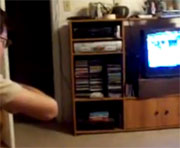
MONDAY, Nov. 23 (HealthDay News) –Young children of working parents may watch even more television every day than previous reports have found, especially kids in home-based day-care settings, a new study finds.
Researchers from Seattle Children’s Hospital and the University of Washington surveyed day-care directors to find out how much television viewing was available and then added on the estimated two or three hours a day of home viewing done by many preschoolers.
“If you add the TV from day-care setting to home viewing, you get about five hours a day,” said lead researcher Dr. Dimitri Christakis, director of the Center for Child Health, Behavior and Development at Seattle Children’s Research Institute and a professor of pediatrics at the University of Washington School of Medicine.
At home-based day care centers, the preschool-age children watched more — 2.4 hours a day on average — compared to 0.4 hours in center-based settings. The differences were less significant with toddlers and infants in home care who viewed 1.6 hours and 0.2 hours, respectively, compared with 0.1 hours for toddlers and none for infants in the centers.
The results, Christakis said, are surprising and somewhat alarming. “When you consider preschool kids are only awake for 12 hours a day, they are spending almost half their waking hours in front of the TV,” he said.
The study was published online Nov. 23 in advance of publication in the December issue of Pediatrics.
For the study, the researchers interviewed directors of 168 licensed child-care programs in four states, Florida, Massachusetts, Michigan and Washington. They asked the directors how many hours of television were usually watched. In all, the directors of 94 home-based programs and 74 center-based programs participated.
Those in home-based programs watched, on average, double the amount viewed in center-based programs.
“A lot of home-based day care programs are using a lot of ‘screen time’,” Christakis said, noting that many prior studies of TV viewing time rely on parent reports of home viewing and don’t ask about day-care viewing time.
The researchers did not ask specifics about the content of the program. “No doubt some is educational,” Christakis said. “But it really doesn’t matter. Even the best educational program is no substitute for real, live human interaction.”
His advice? “Parents should make a point of inquiring how much time the television is on “when searching for day care or with their current arrangement.”
And, he said, if there is too much television viewing at day care, parents can adjust downward the TV time at home. He cites the recommendation from the American Academy of Pediatrics, suggesting no TV for the first two years and a daily limit of one to two hours for older children. Less than that is even better, Christakis said.
The findings don’t surprise David Bickham, a research scientist at the Center on Media and Child Health at Children’s Hospital Boston and an instructor of pediatrics at Harvard Medical School. “I think it’s an important study,” he said, agreeing that researchers often overlook TV time in day-care settings.
”I do think they have touched on something unique here that is very important,” Bickham said. While TV can be educational, Bickham suspects that at day care, television is “often used as a way to fill the time.”
The message on this is clear, Bickham and Christakis agreed. “Parents need to go and talk to their day-care center and find out what is going on with media use,” Bickham said.
When shopping for day care, parents may want to ask about the director’s educational background, the findings suggest. In home-based programs in which the director had a two- or four-year college degree, TV was watched less than in those centers where the directors did not have a college background, Christakis found.
Too much screen time, especially at day care, may mean that preschoolers miss out on opportunities to interact, socialize and learn language and other skills, both Bickham and Christakis said.
More information
To learn more about children and media, visit the Center on Media and Child Health.

